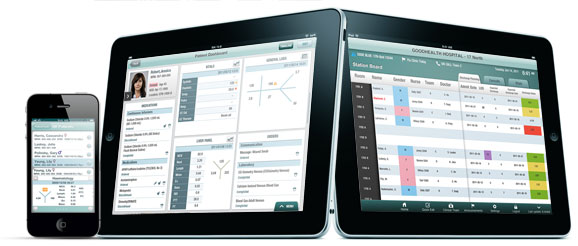VitalHub’s partnership with Microsoft and Intel for Seattle Children’s Hospital pilot and British Columbia contracts featured in Canadian Healthcare Technology
 “As hospital invest continue to invest in mobile solutions, doctors and nurses are more likely to be texting on their smartphones or swiping their fingers across a tablet PCs than tapping away on desktop computers,” Dianne Daniel writes in the April 2015 issue of Canadian Healthcare Technology in an article titled, “Smartphones and mobile tablets are becoming essential tools for clinicians” (page 12-13 of the print edition).
“As hospital invest continue to invest in mobile solutions, doctors and nurses are more likely to be texting on their smartphones or swiping their fingers across a tablet PCs than tapping away on desktop computers,” Dianne Daniel writes in the April 2015 issue of Canadian Healthcare Technology in an article titled, “Smartphones and mobile tablets are becoming essential tools for clinicians” (page 12-13 of the print edition).
VitalHub Corp, a Mount Sinai Hospital spun-off through partnership with MaRS Innovation, is among the healthcare technology companies delivering services to hospitals as part of this trend.
Daniel writes:
One company that is giving clinicians the option to use their preferred device — whether iOS, Android, or Windows 8, smartphone or tablet — is VitalHub Corp, a Mount Sinai spin-off launched in Toronto in 2009. “We have found that many hospitals provide their nurses with mobile devices and can therefore select the platform they would prefer for those users, but physicians are generally expected to be BOD,” said VitalHub CEO Lisa Crossley. “So for a mobile solution to be practical, it has to be cross-platform.”
Whereas the Ottawa Hospital and MUHC develop their own mobile apps, VitalHub is designed as a proprietary middleware and a set of mobile applications that sit on top of disparate clinical information systems already in place. Hospitals pay for the VitalHub server upfront and mobile apps are provided for a monthly fee.
The initial application, VitalHub Chart, provides an easy-to-use interface to both review and enter patient data. Since then, the company has launched VitalHub Station, an electronic version of the whiteboard commonly found at nursing stations, and VitalHub Care, a community-based platform that allows clinicians to monitor complex and post-surgical patients in their homes.
The goal of VitalHub Care, stated by Crossley, is to “prevent life-threatening complications and costly readmissions by allowing physicians to intervene earlier.” In addition to being sent home after surgery with a list of post-care instructions and meds, patients are also equipped with a tablet PC pre-loaded with VitalHub Care, and a suite of Bluetooth-enabled monitoring devices sure as a pulse oximeter, blood pressure cuff or glucose monitor.
[ . . .]Right now, VitalHub is working with Microsoft and Intel to implement a VitalHub Chart pilot at Seattle Children’s Hospital. The company also won a request for proposal from Health Shared Services of British Columbia (HSSBC) on behalf of the B. C. Provincial Health Services Authority (PHSA) and Vancouver Coastal Health to provide a mobile clinical integration solution to more than 5,000 physicians and thousands of nurses and other health professionals.
“Rather than replacing costly and complex legacy clinical systems, VitalHub improves their usability,” said Crossley. “Mobile solutions ensure that patient information can be entered and reviewed quickly and easily, saving clinicians’ time, minimizing the risk of errors, facilitating early intervention and reducing overall costs to the healthcare system.”
The complete article is available on Canadian Healthcare Technology‘s website.

